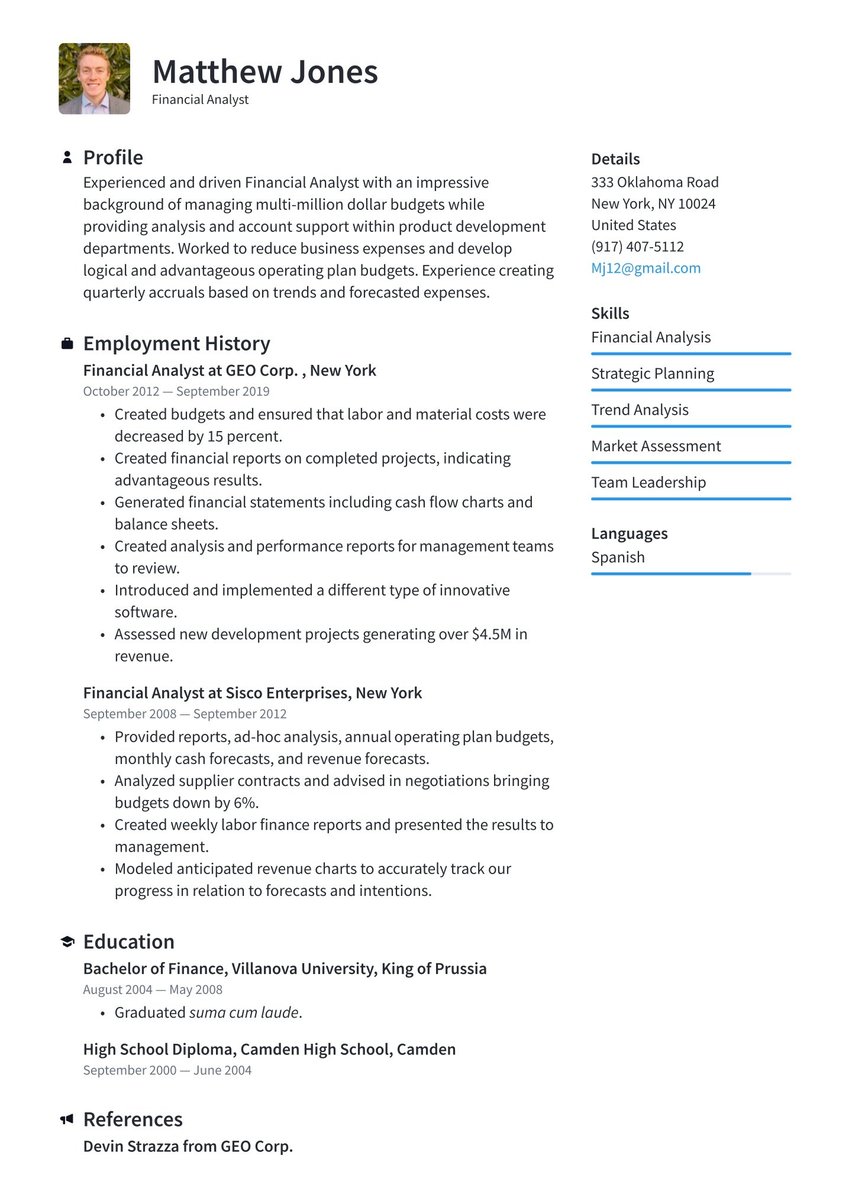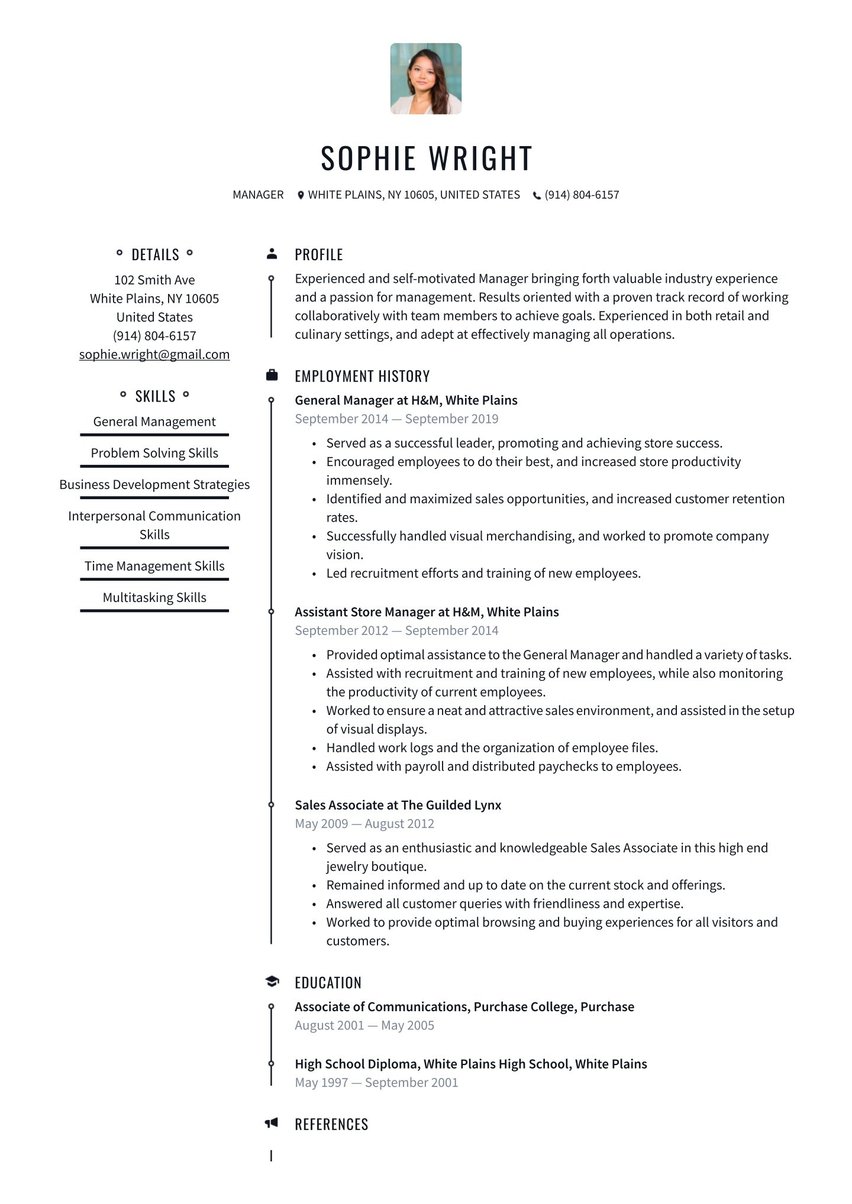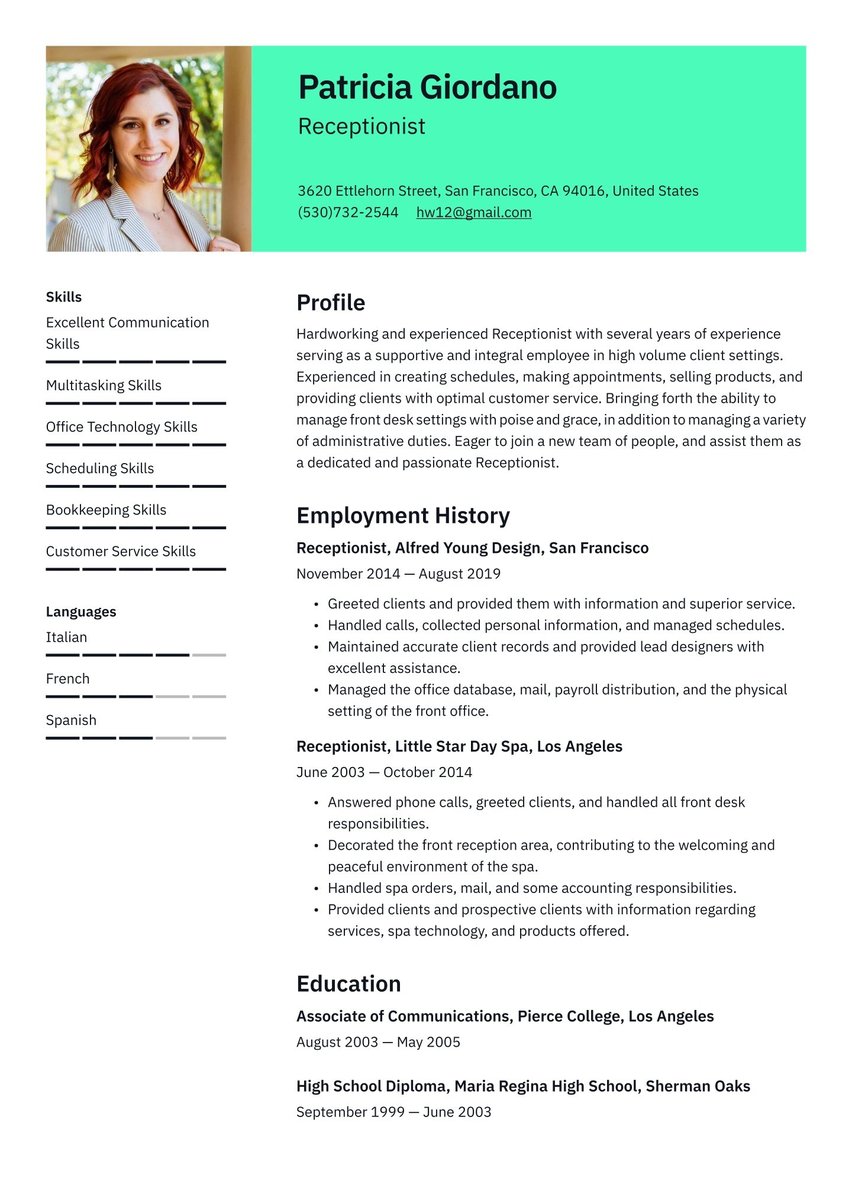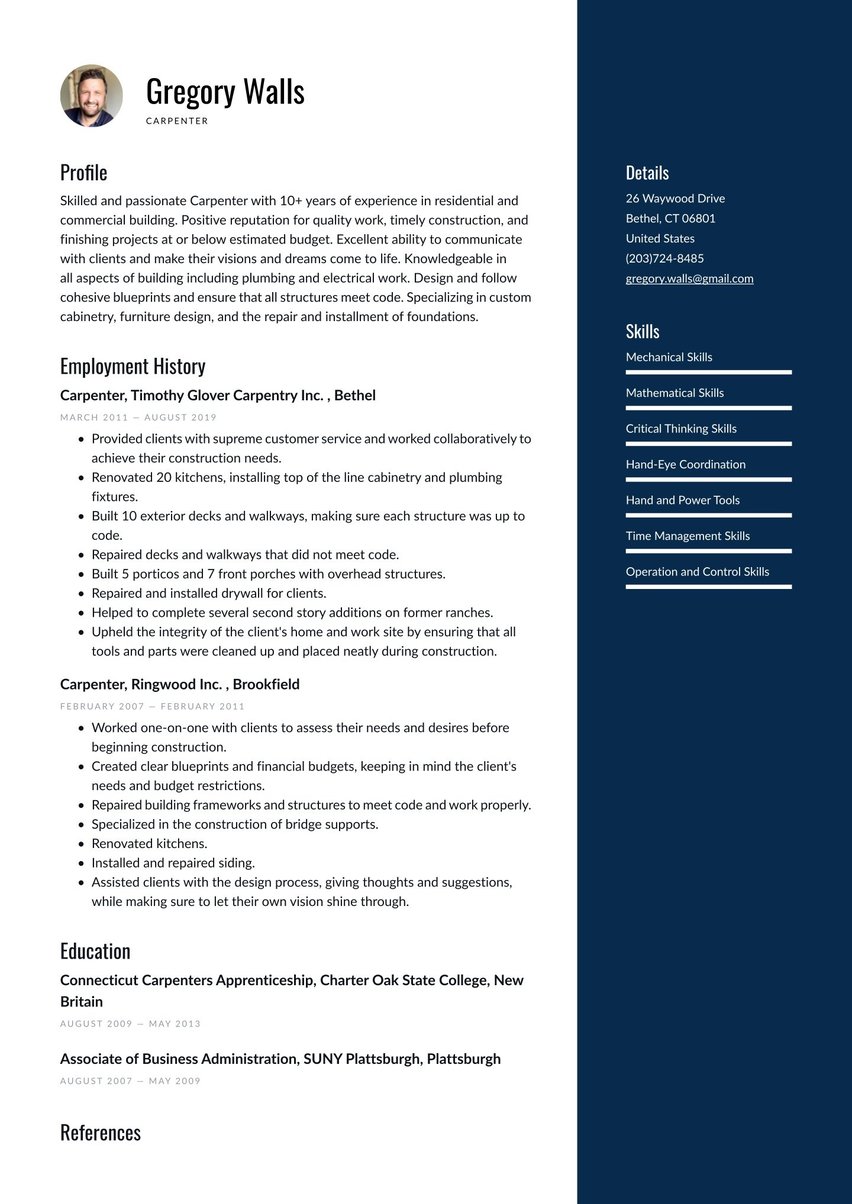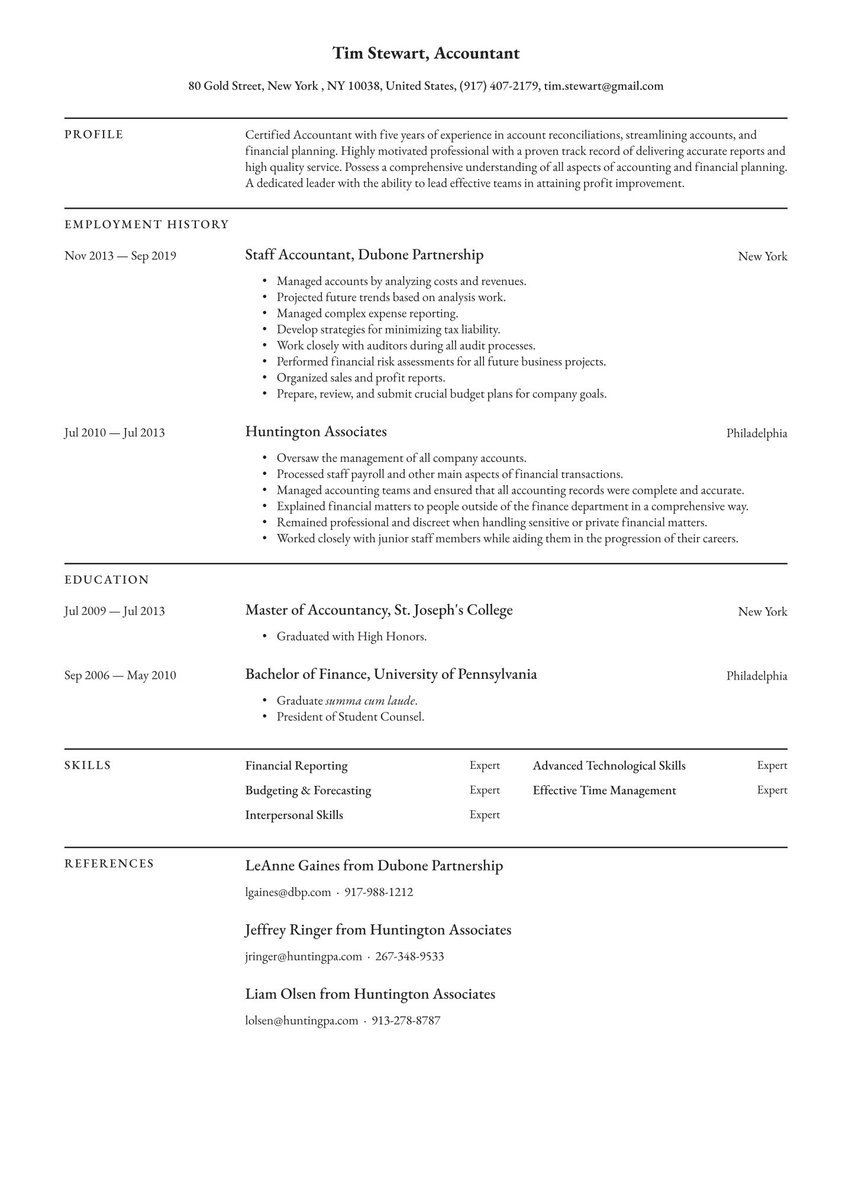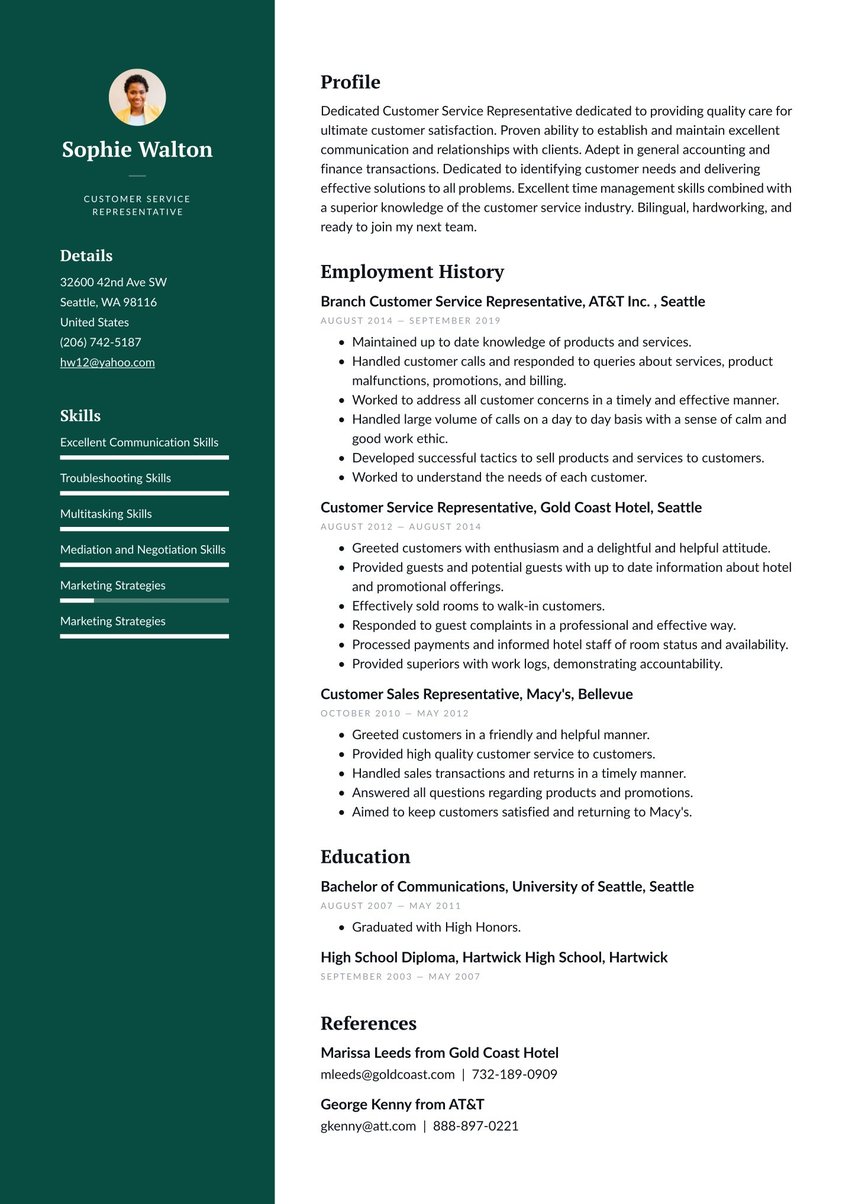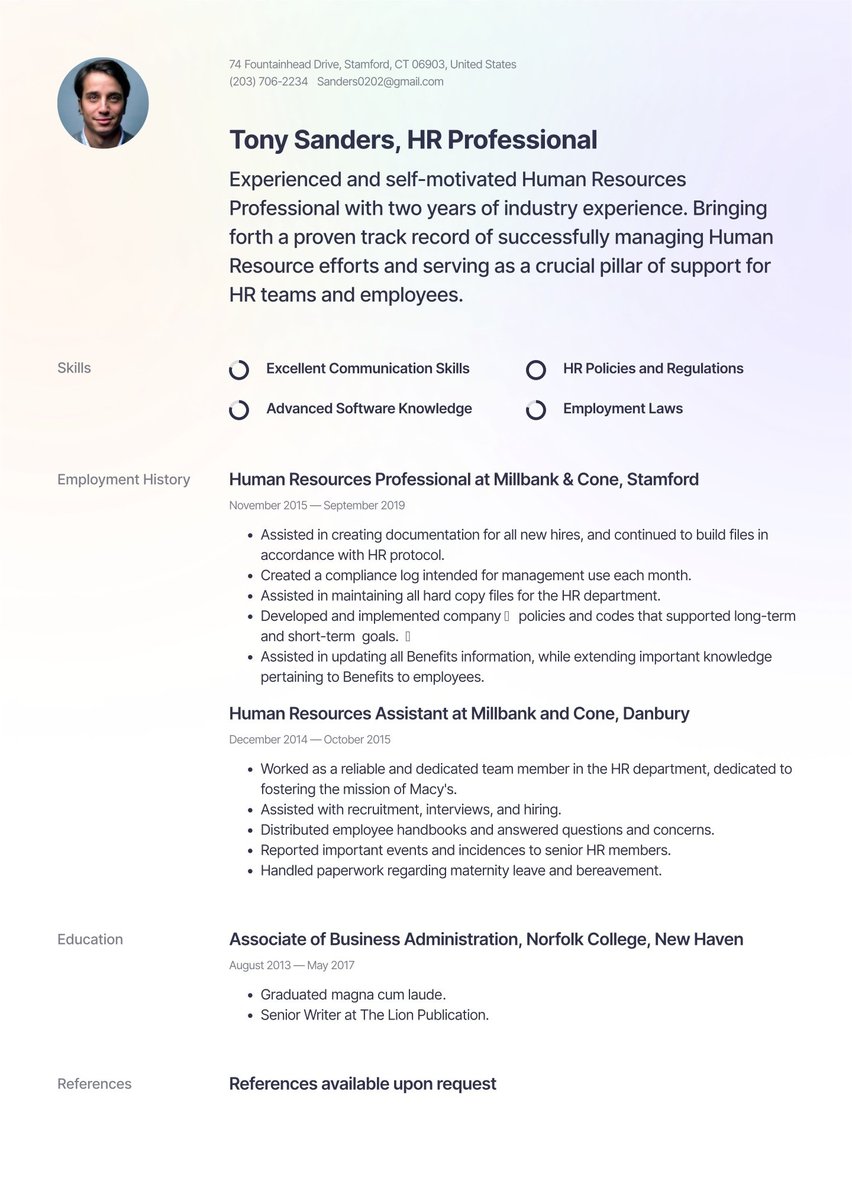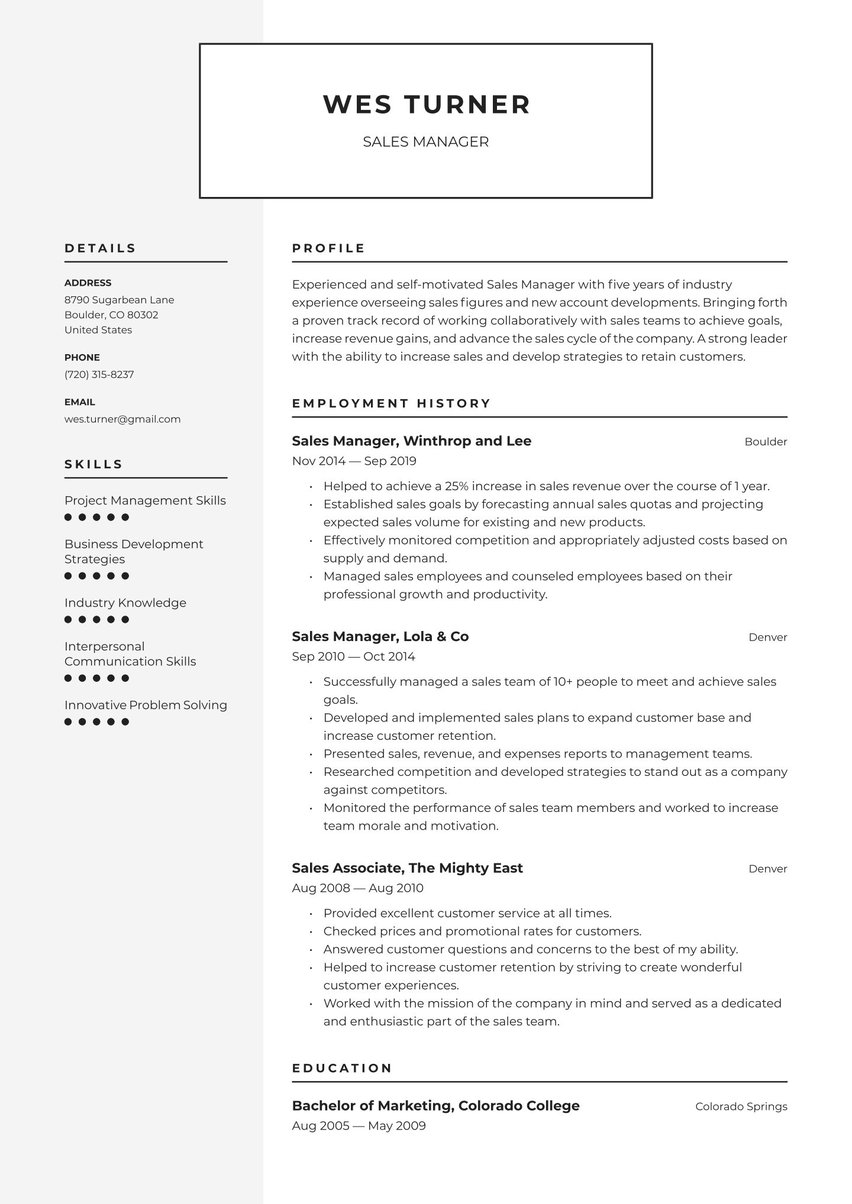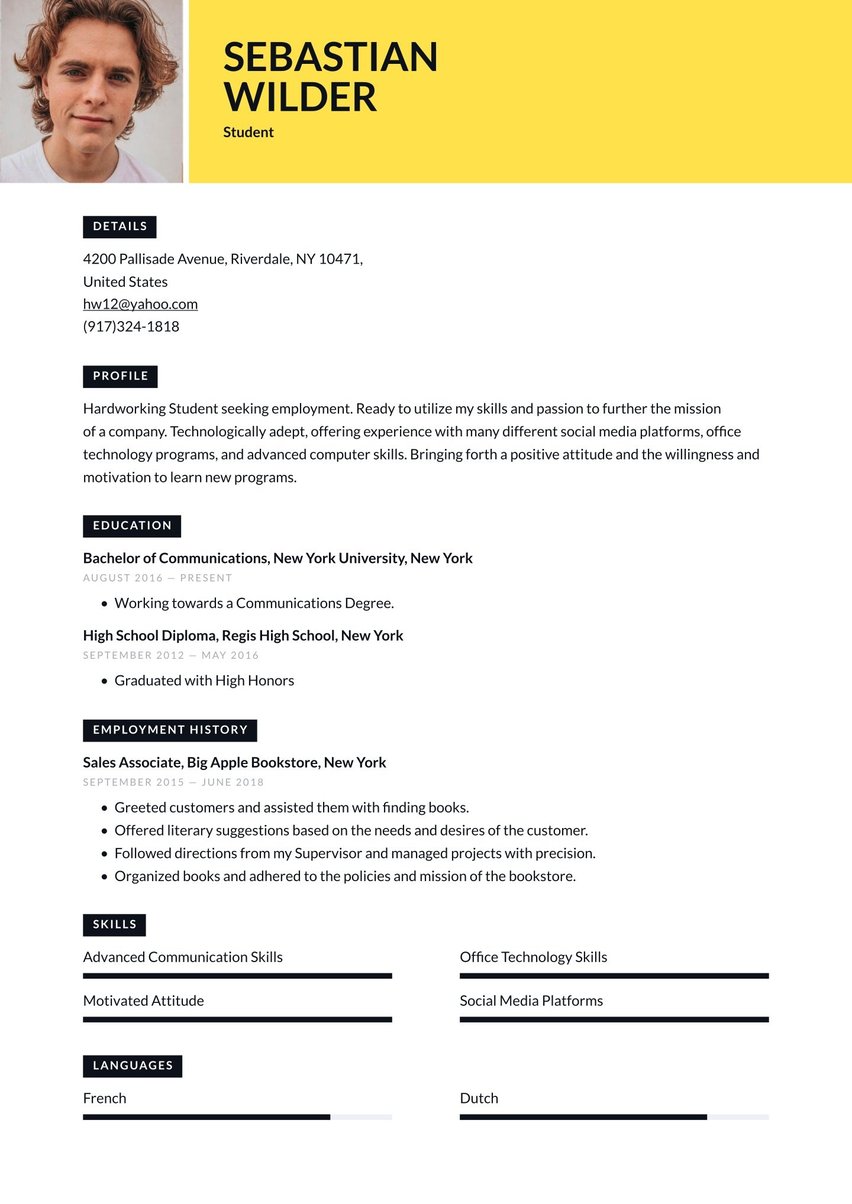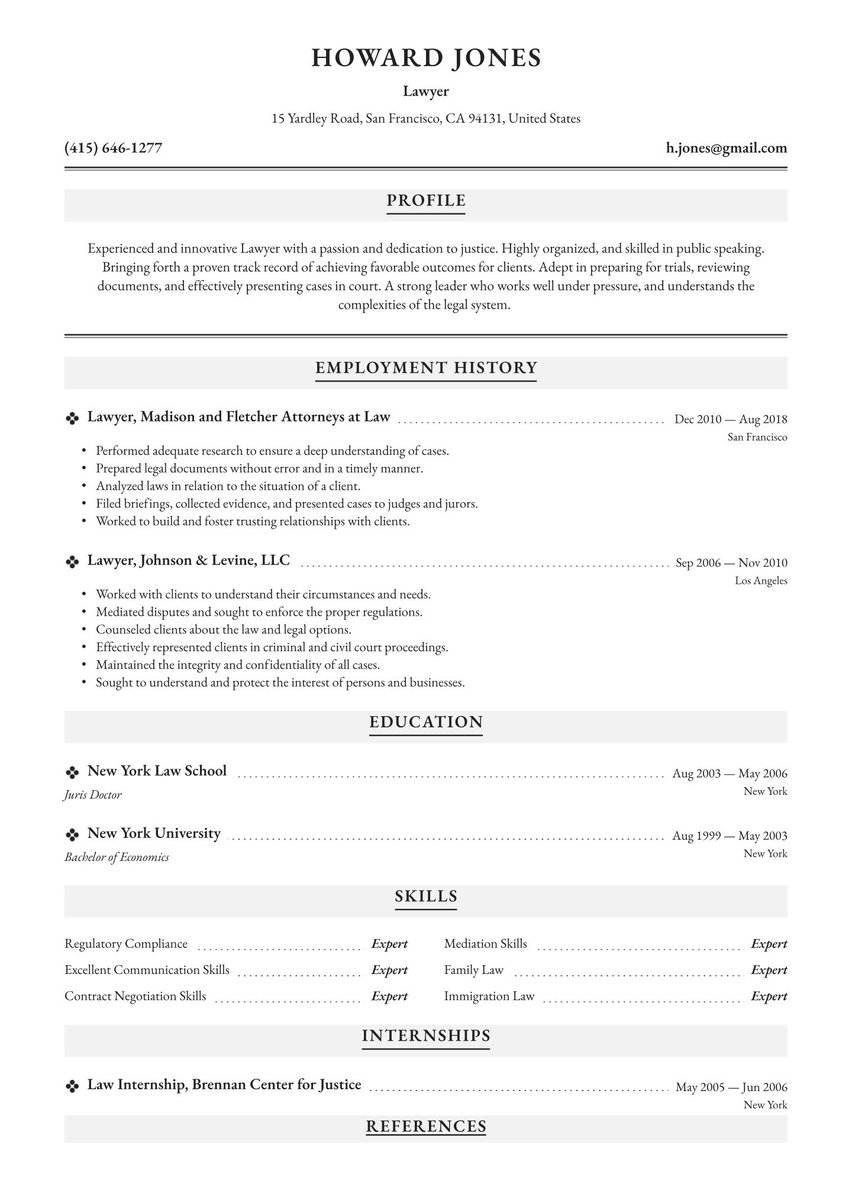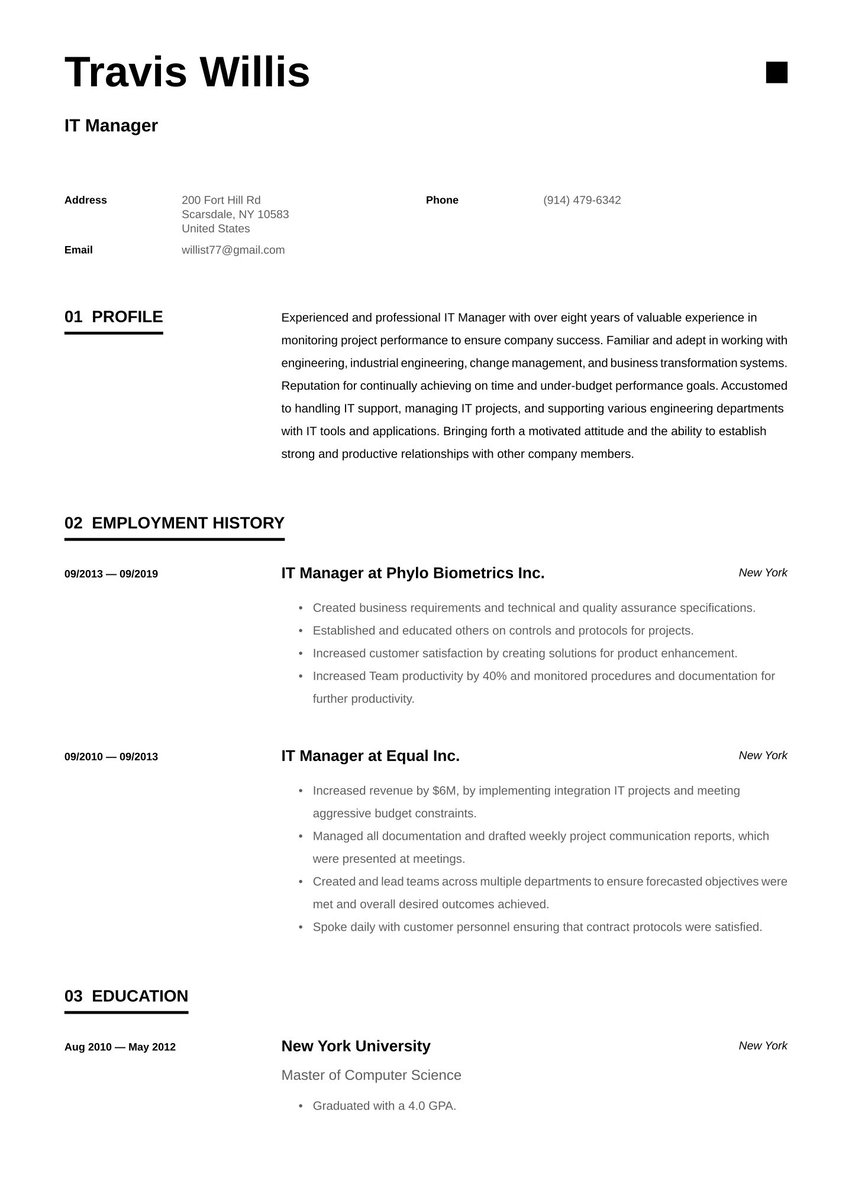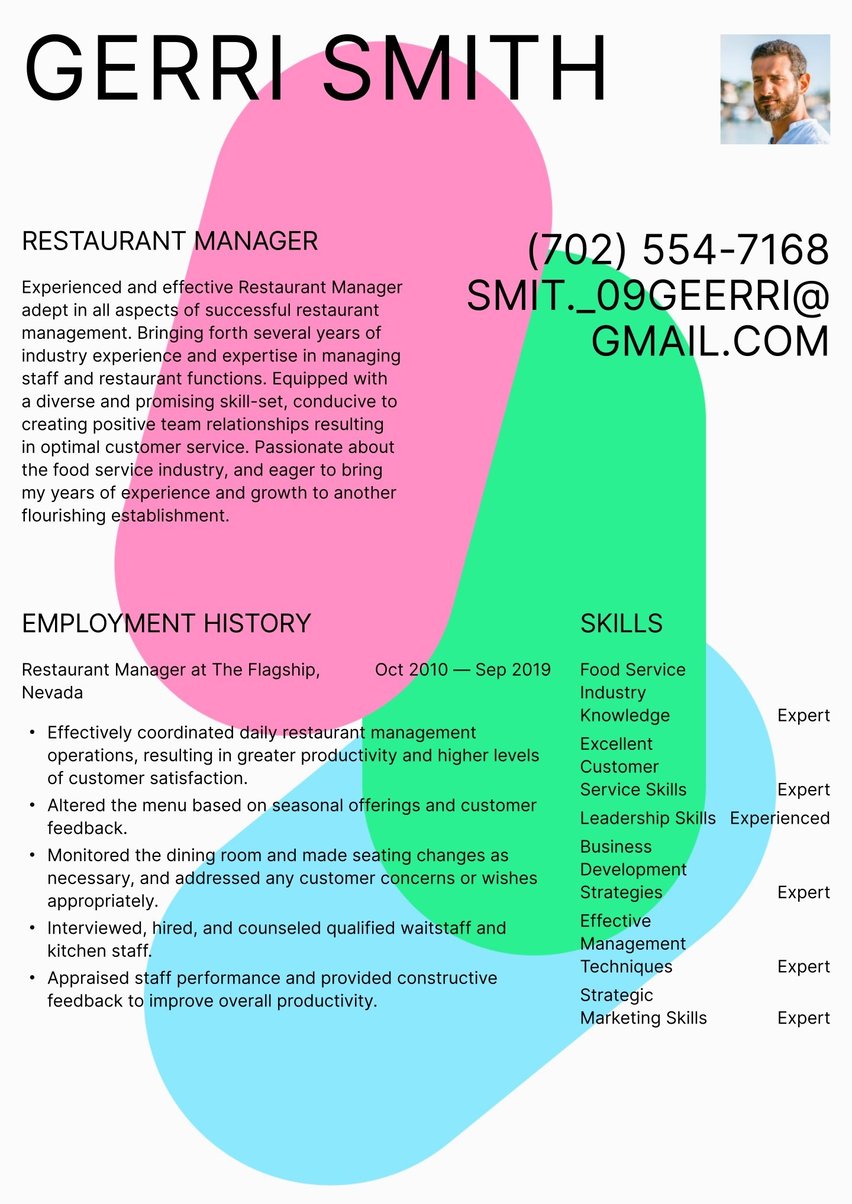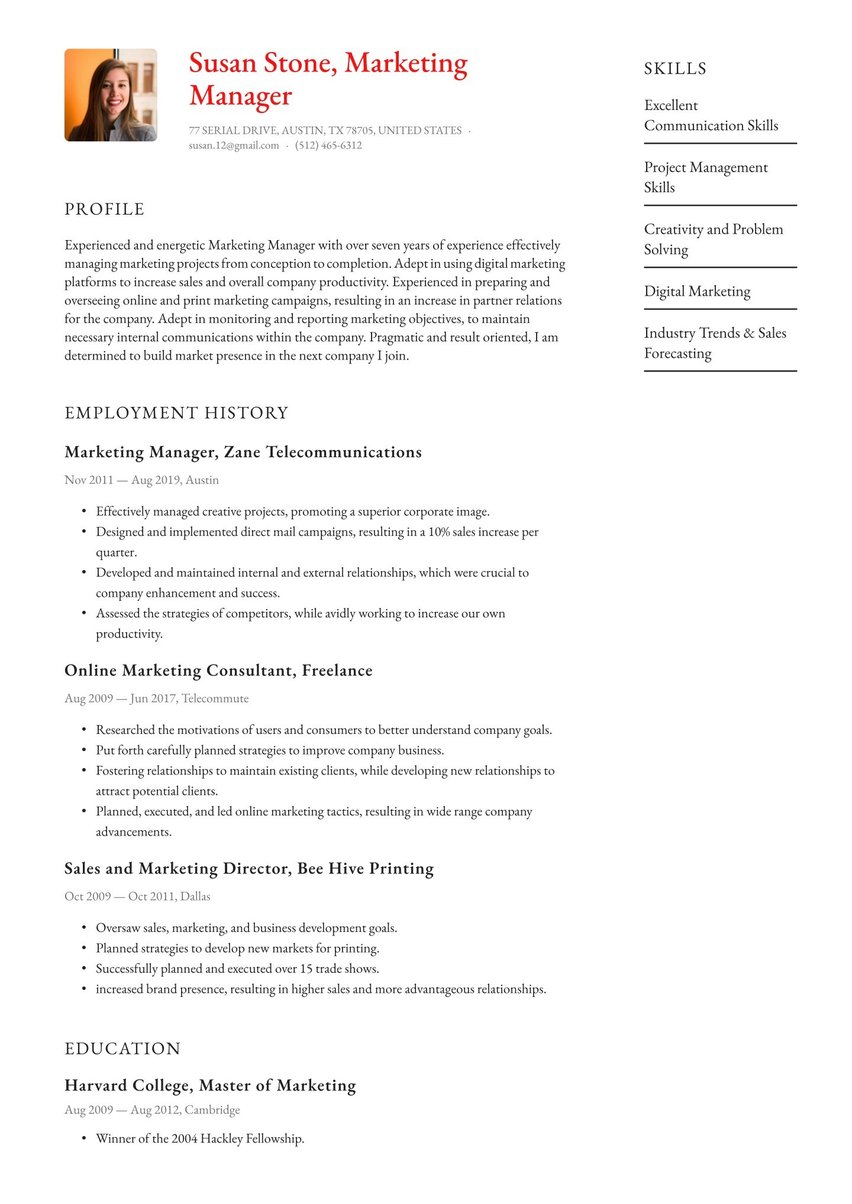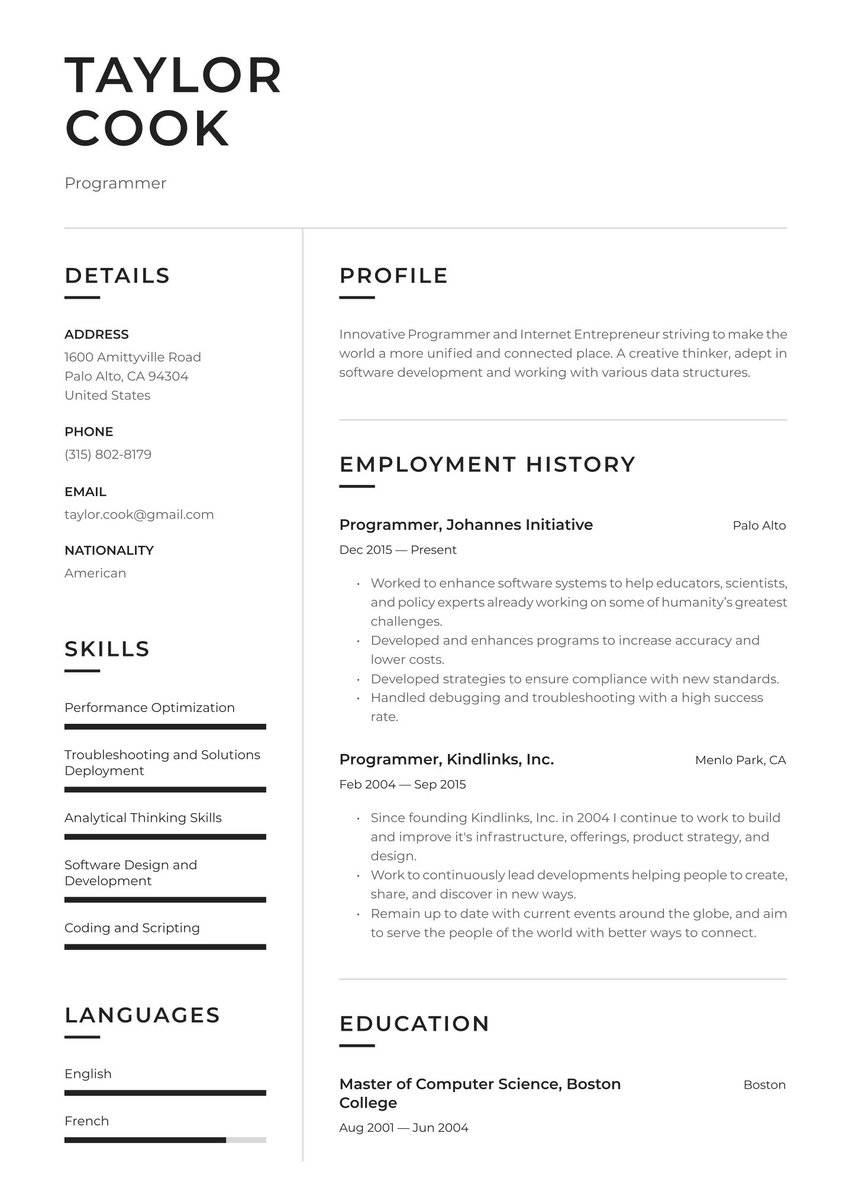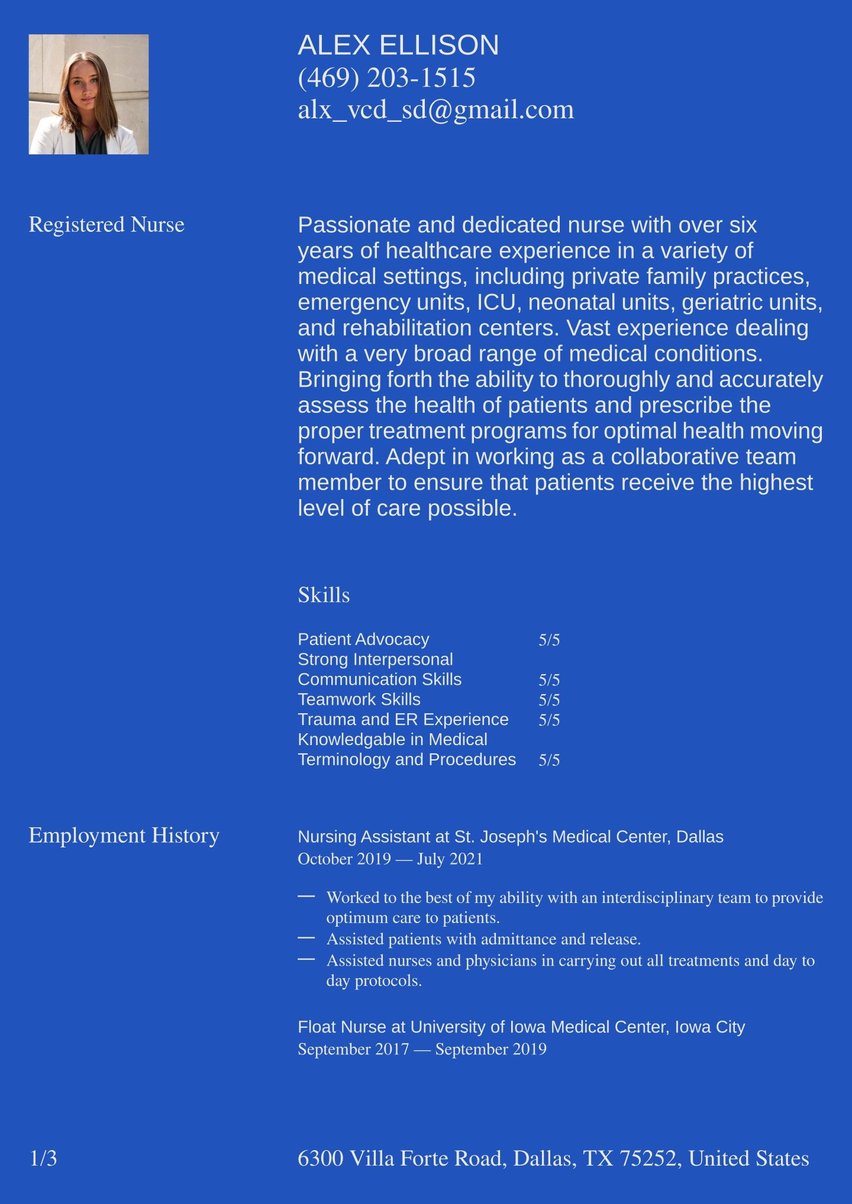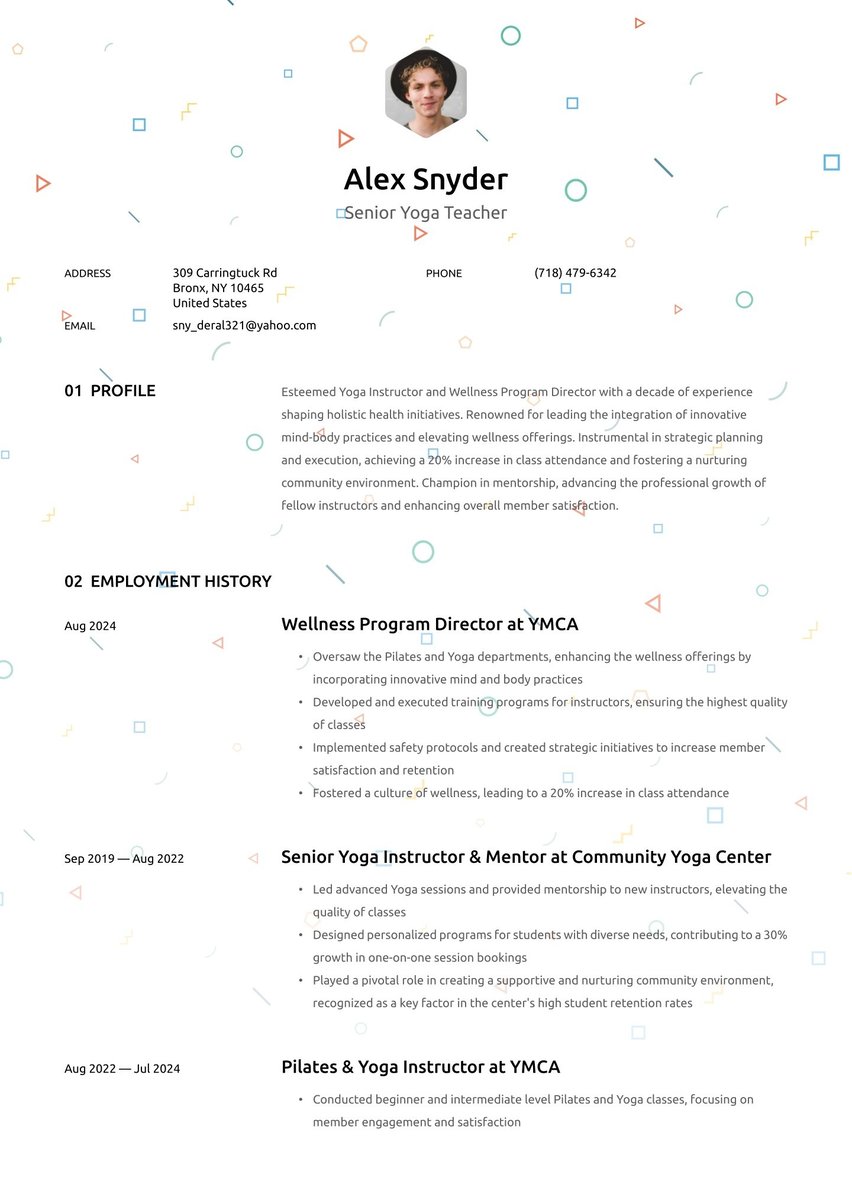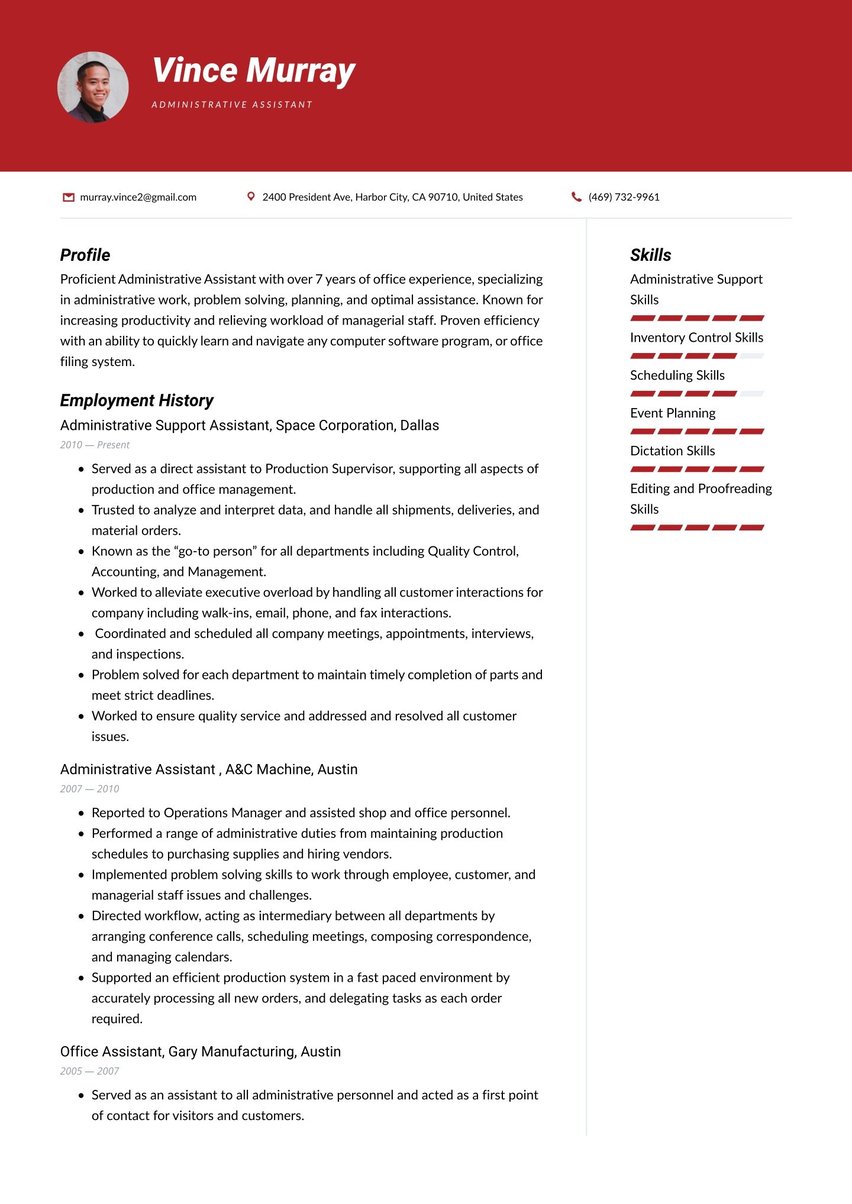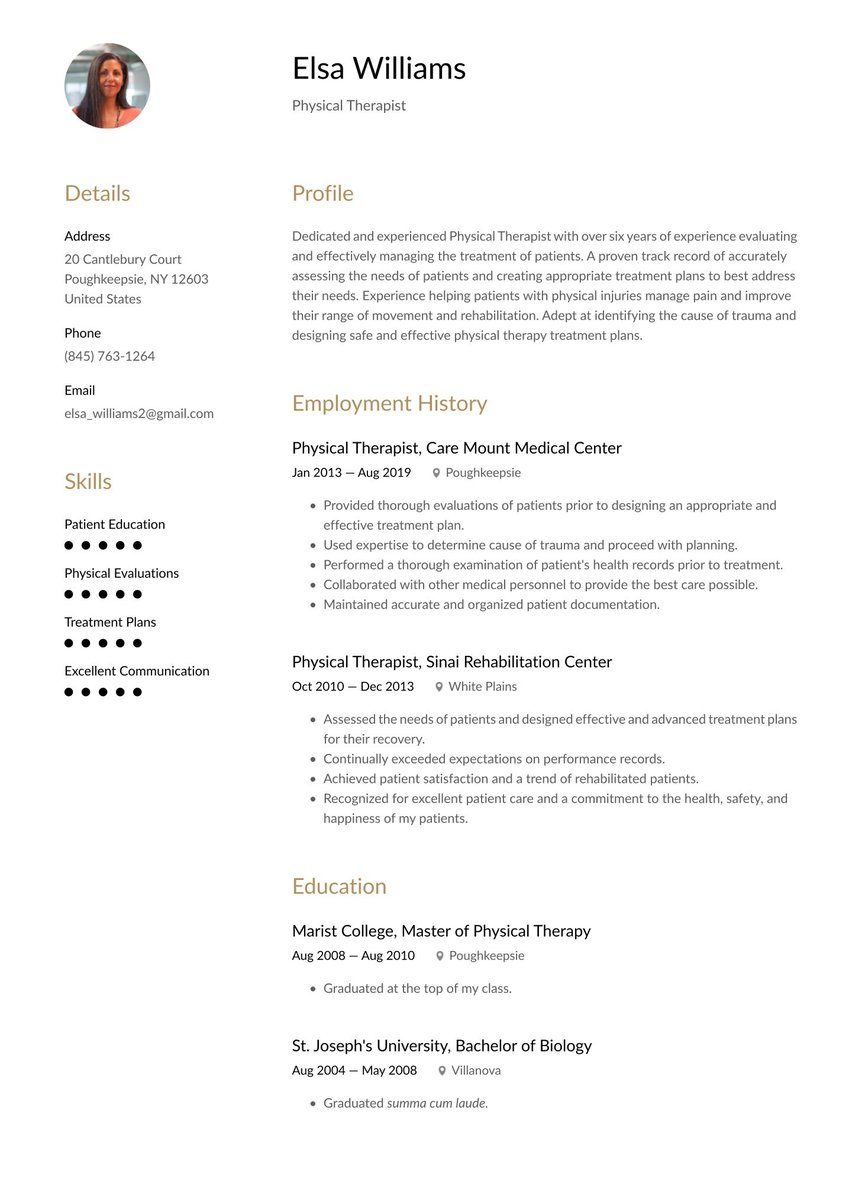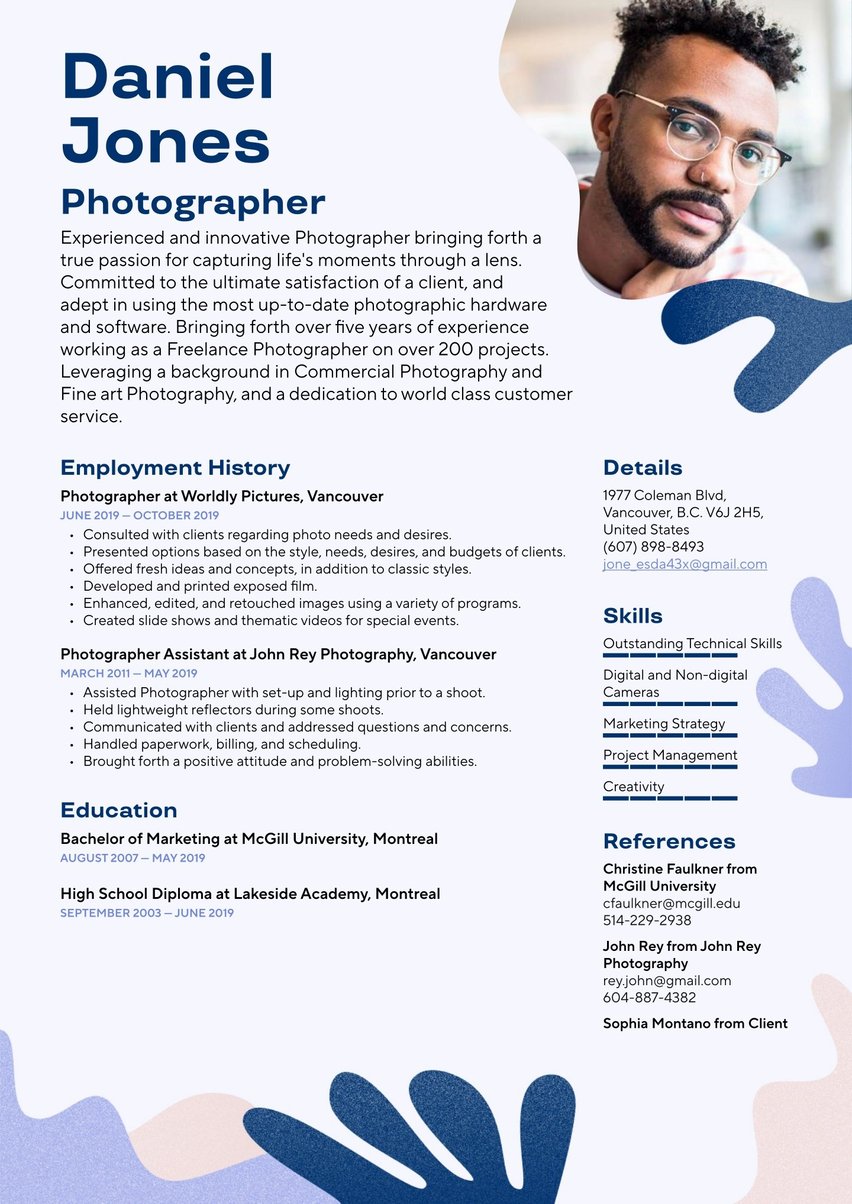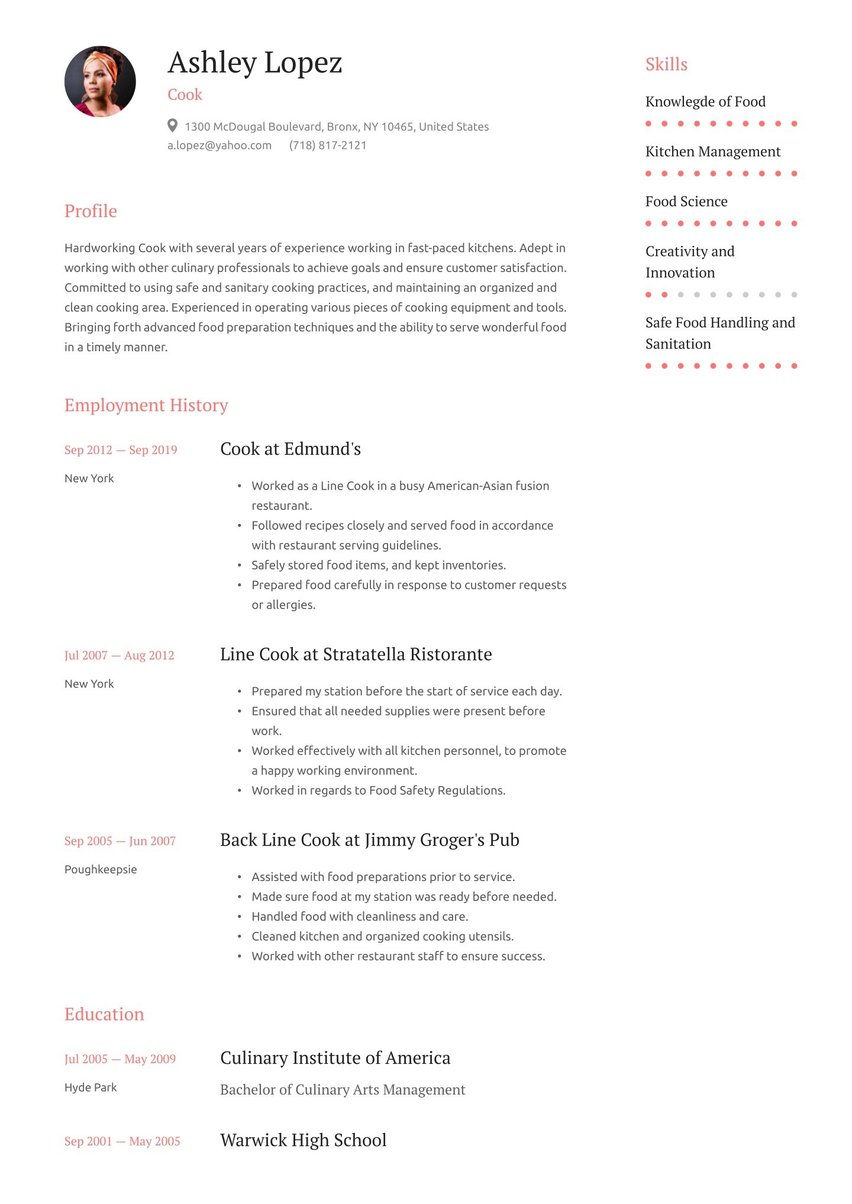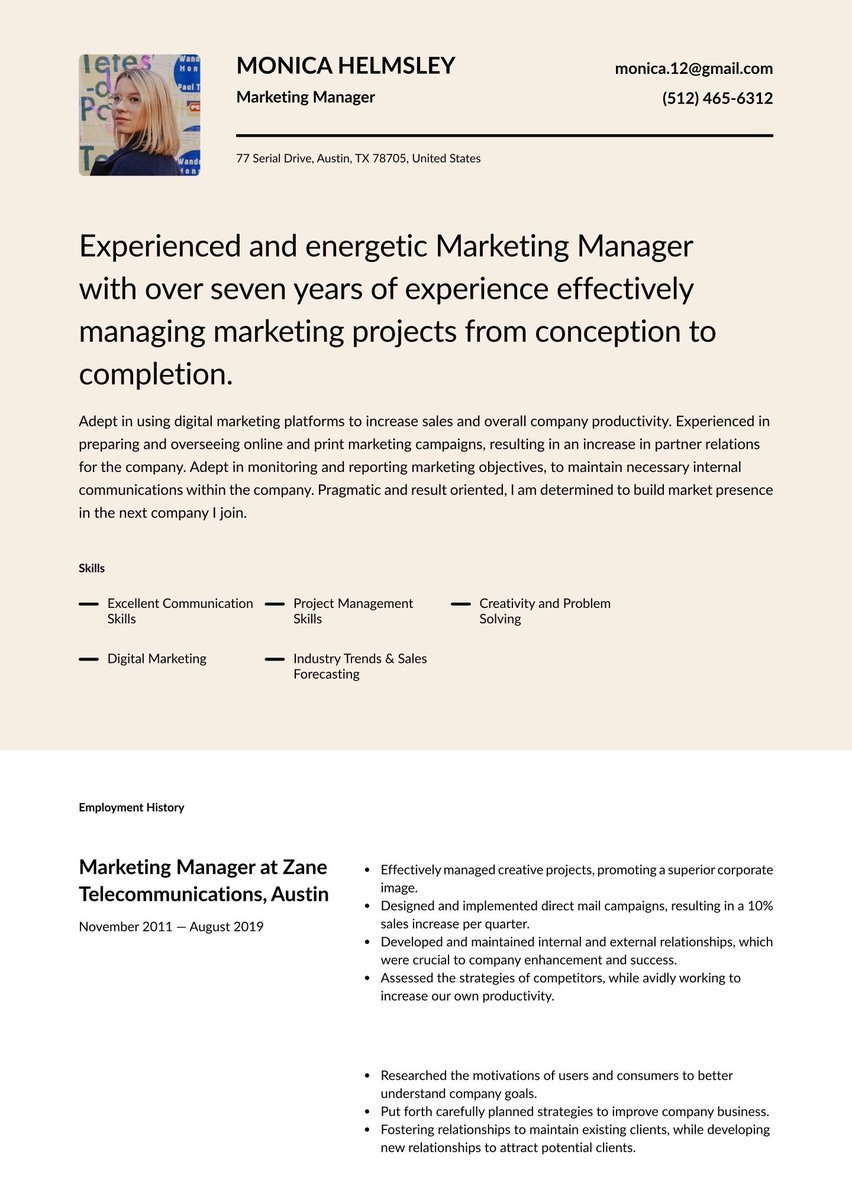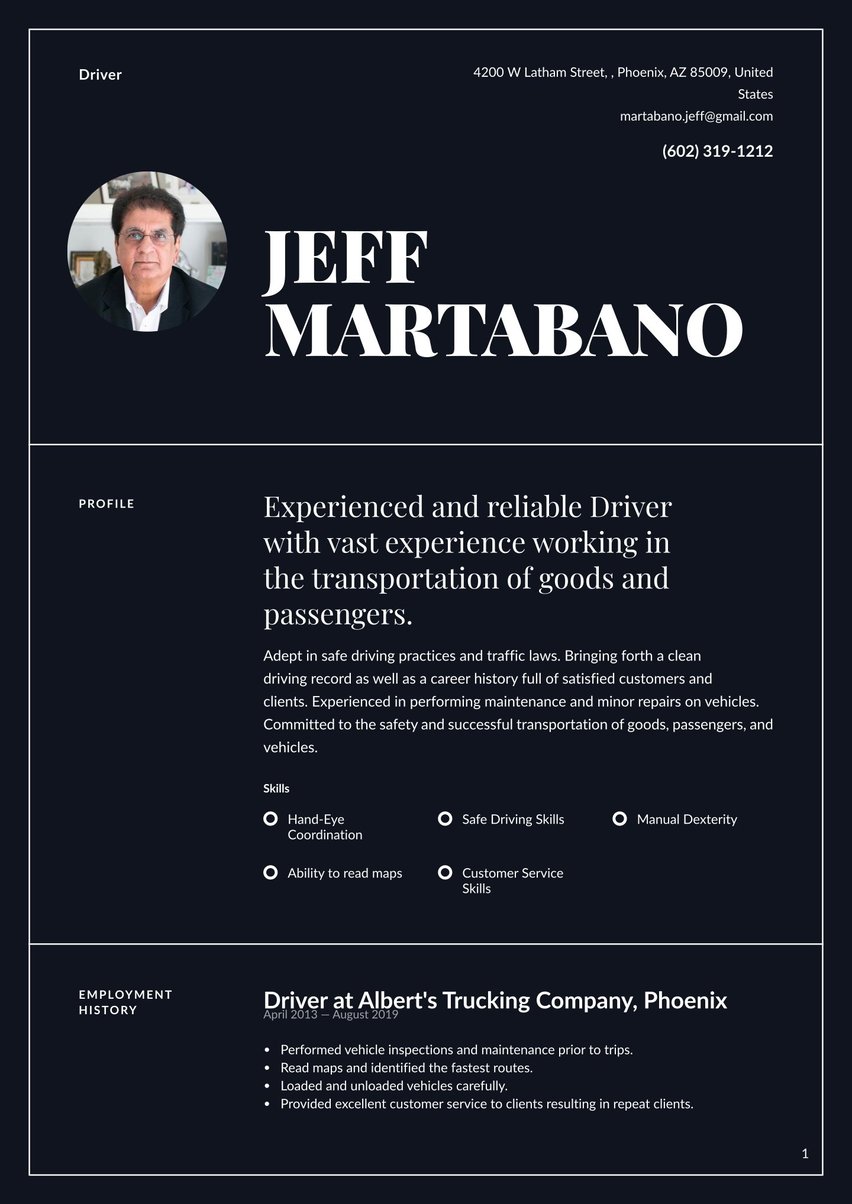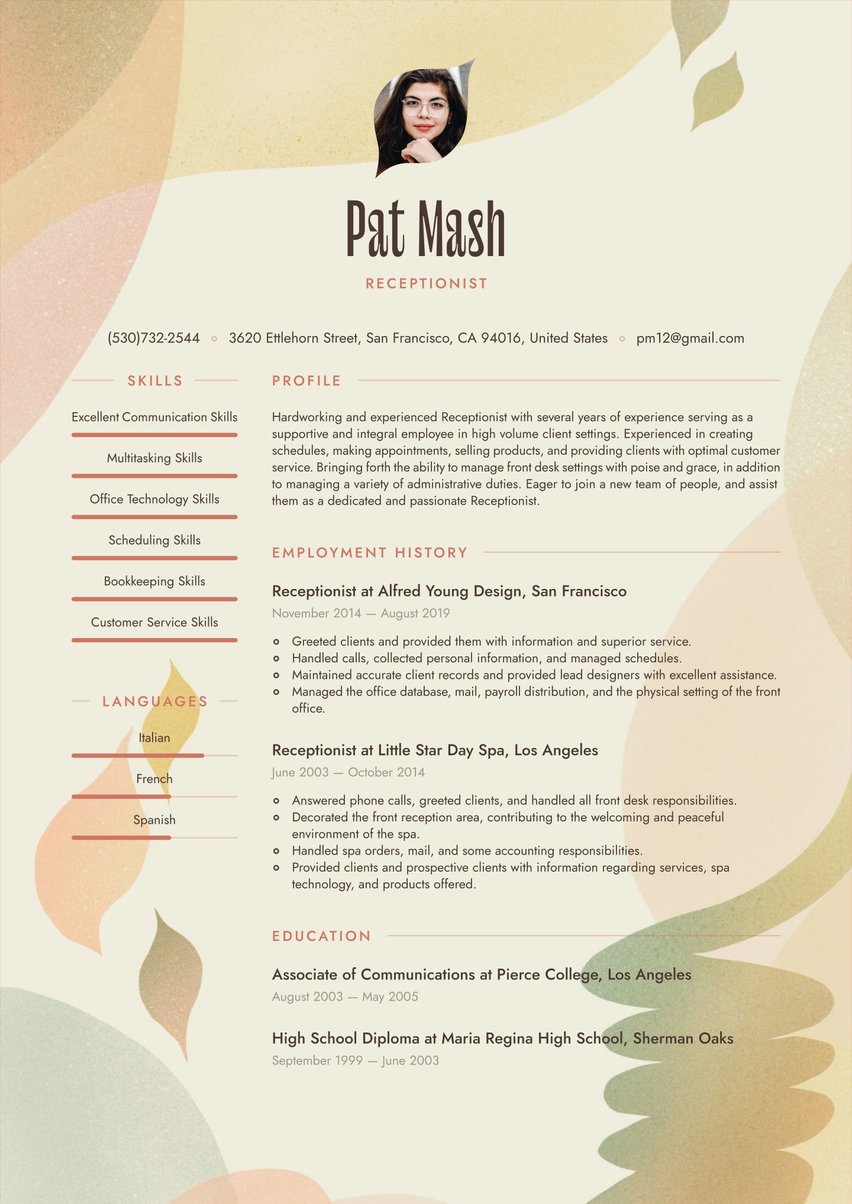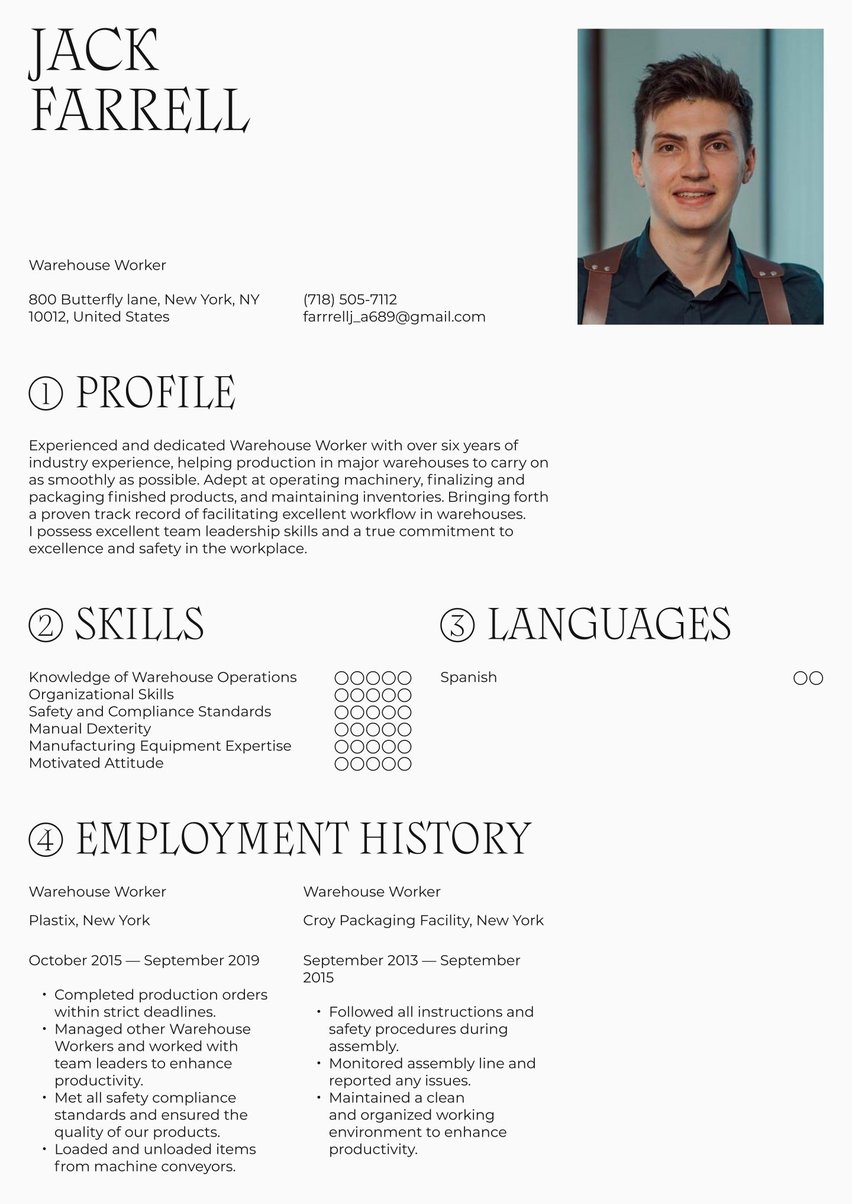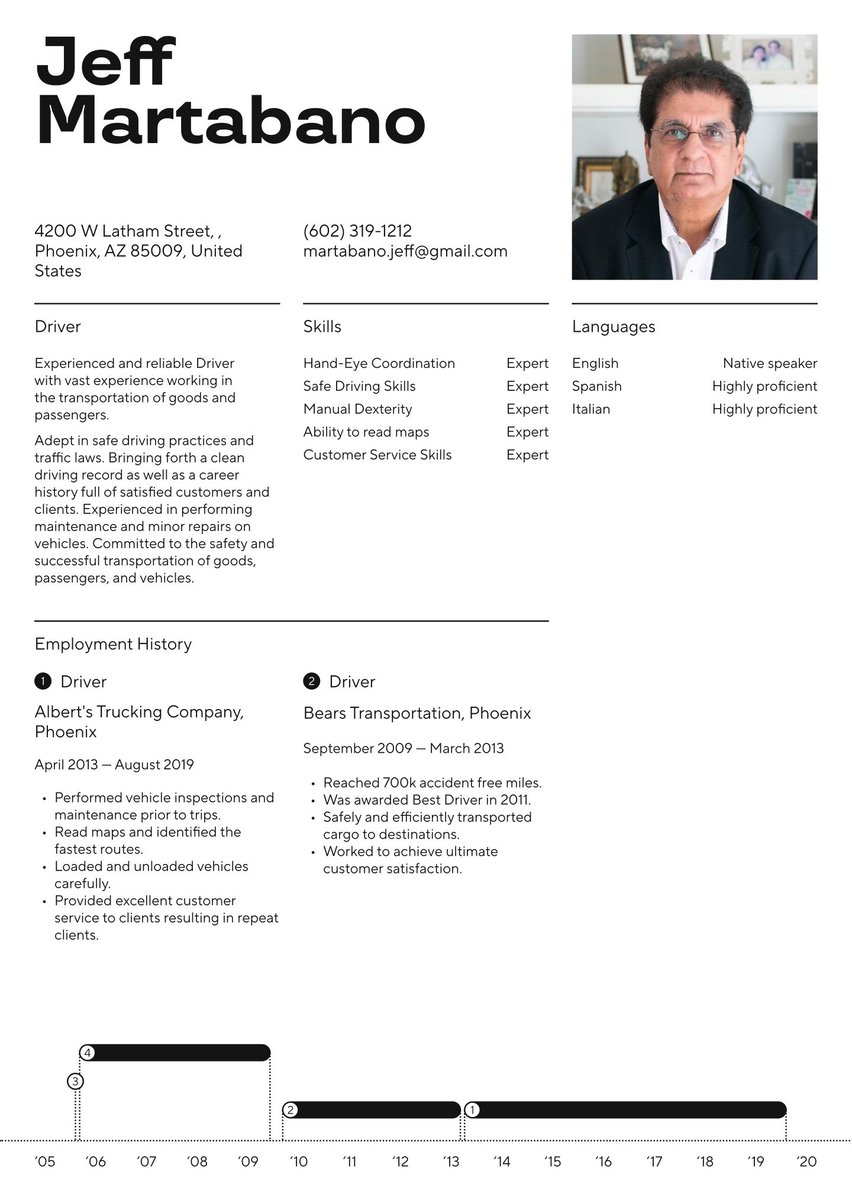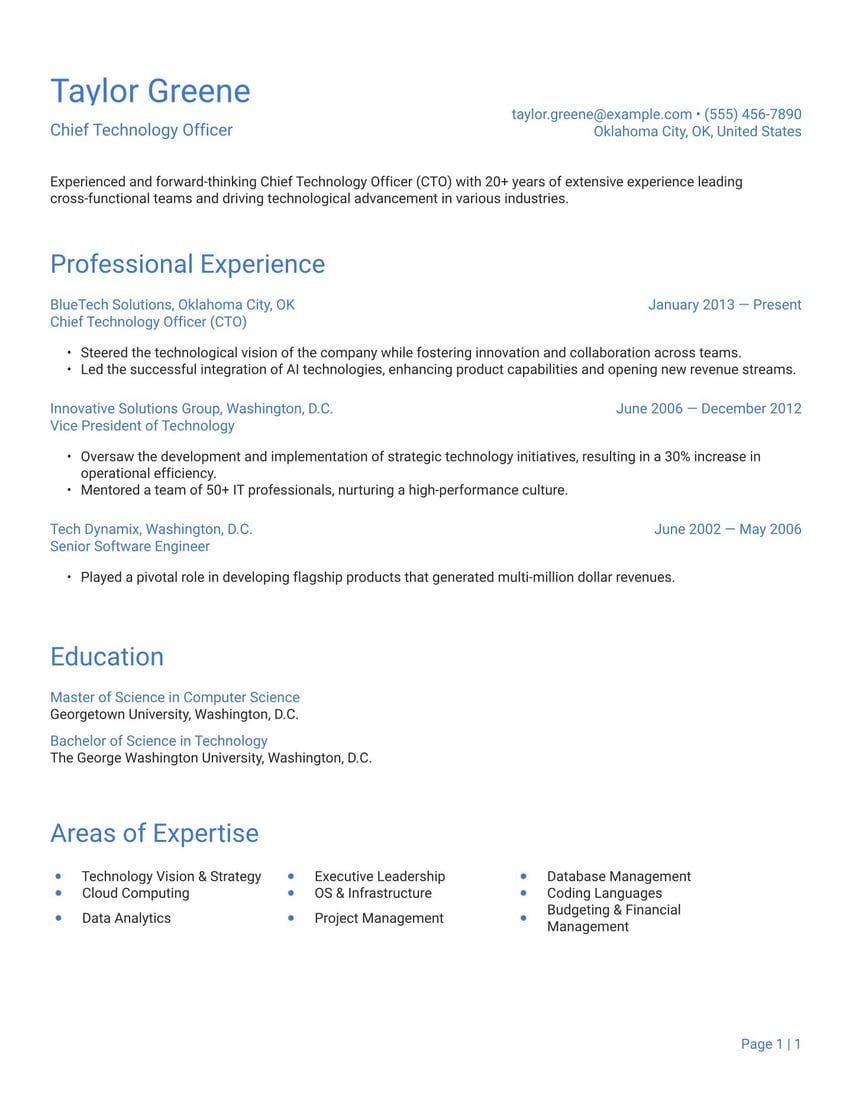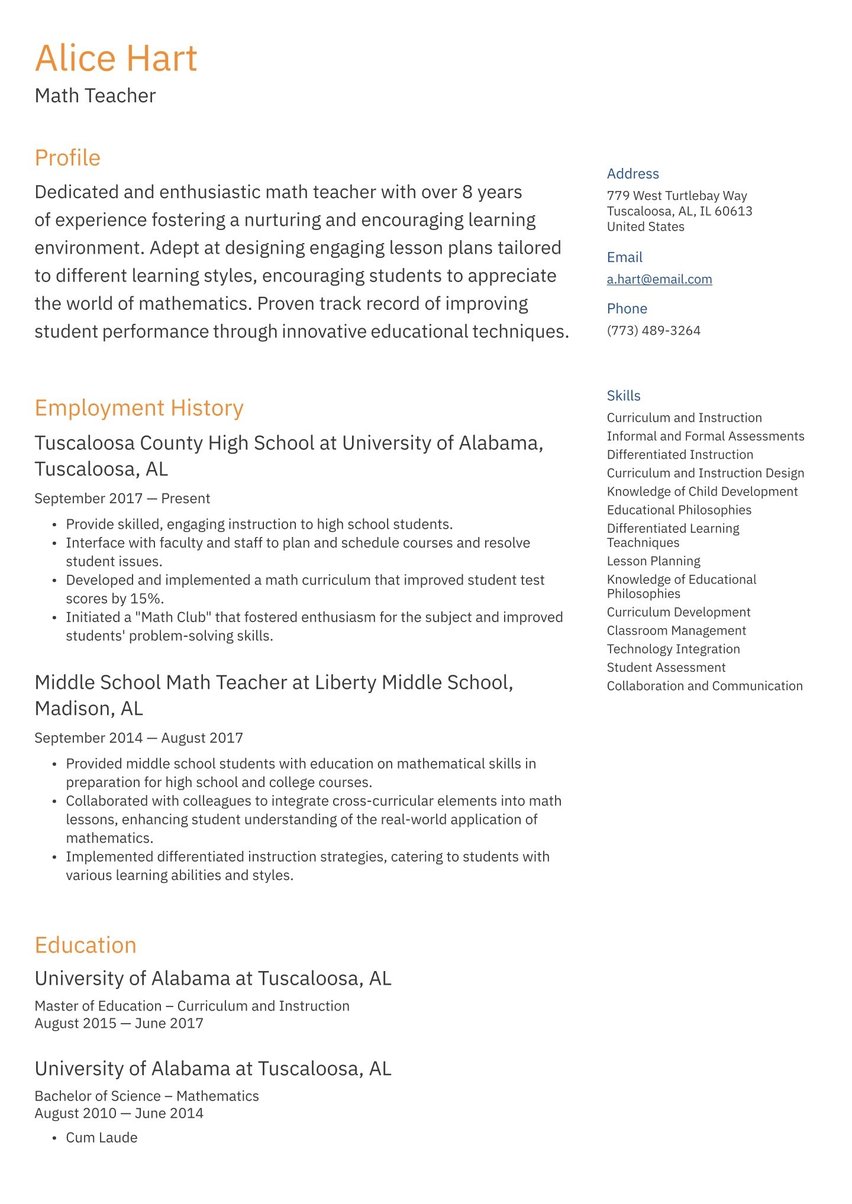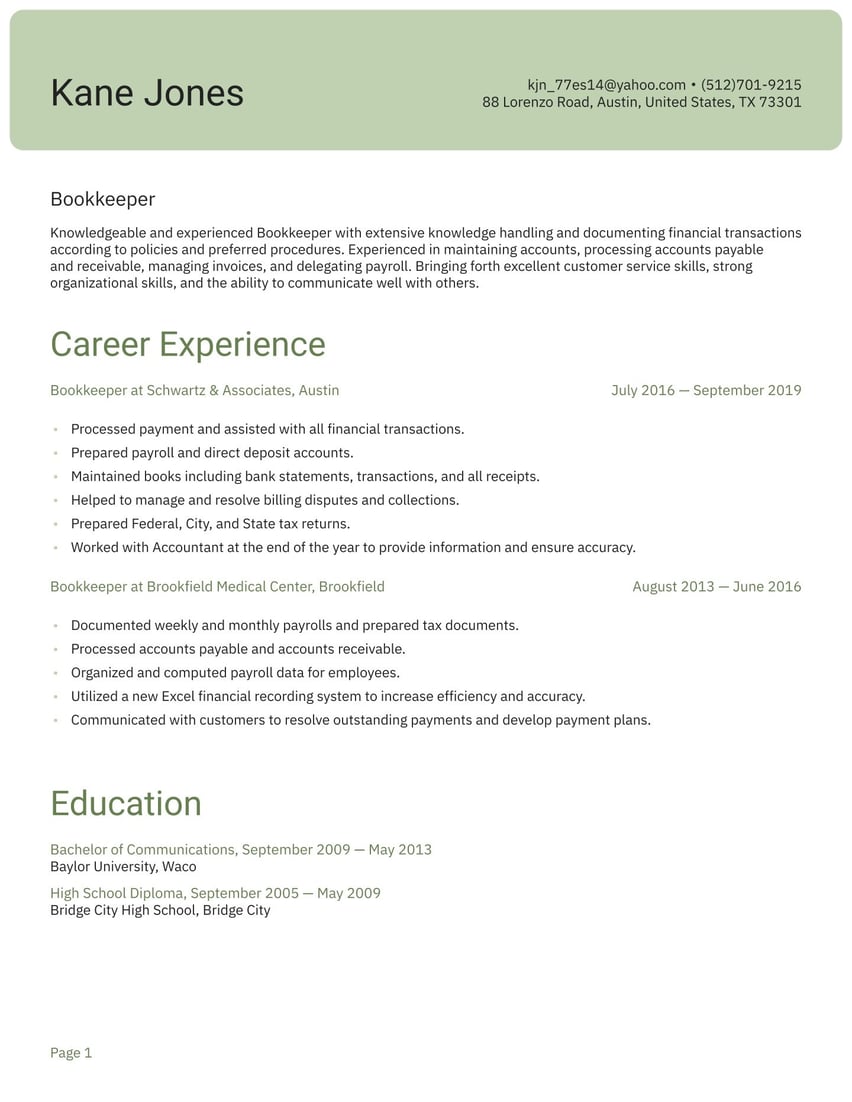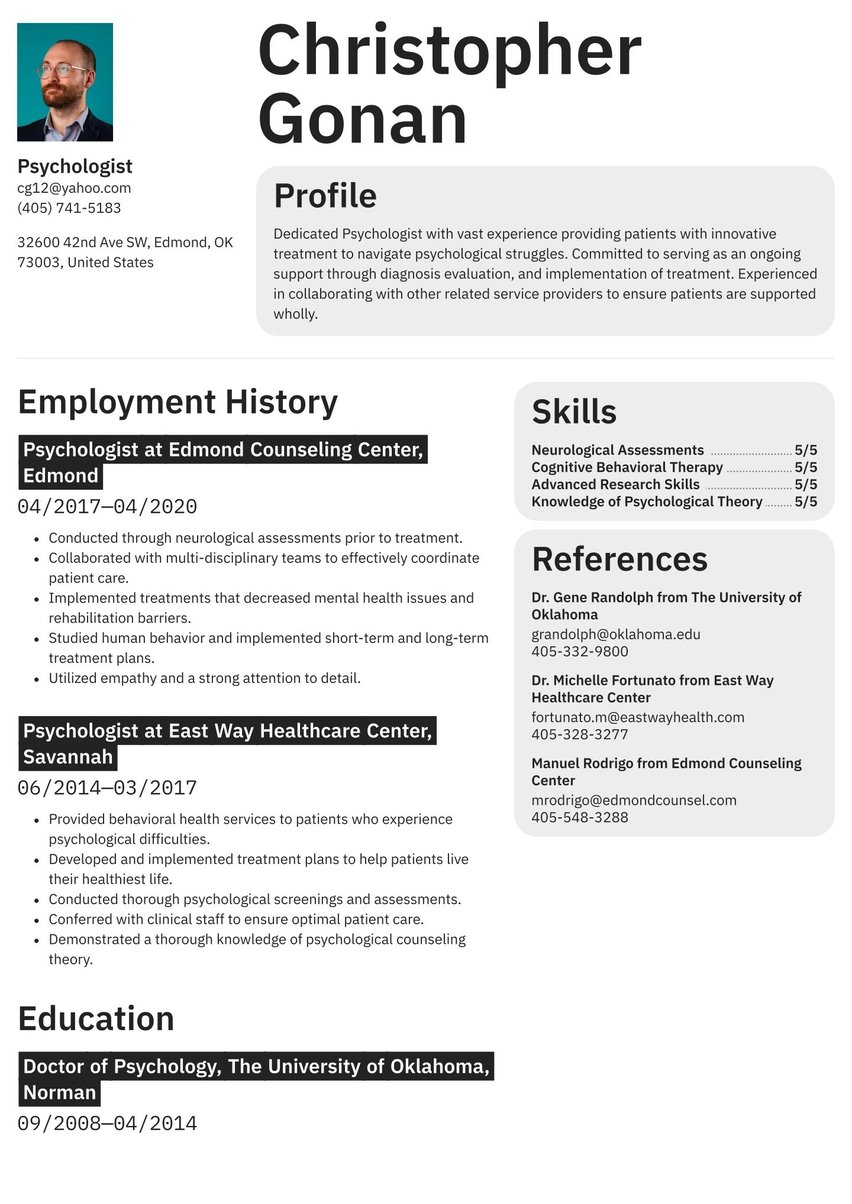Your voice portrays many different characters and commands attention. As a voice actor, that is your key to success. But as you seek new voice acting roles, you need to command attention without your voice first.
Voice Actor resume examples by experience level
You need a great voice-over actor resume—one that clearly demonstrates your ability to perform voice-overs for movies, television shows, commercials, video games, or any other form of media you can imagine.
Resume guide for a voice actor resume
Just as you have a professional voice in the recording studio, you need a professional voice for your resume. Here at Resume.io, we have everything you need, including 500+ resume examples. Using one of our expertly-designed resume templates, our online resume builder, and this writing guide will help you succeed.
This resume guide and corresponding voice actor resume sample will cover:
- How to write a voice actor resume
- Choosing the right resume format for a voice actor resume
- Displaying your contact information
- Using summaries to show off your skills
- Adding your voice acting experience
- Listing education and relevant training
- Picking the right resume design and layout
- What the job market and salary trends look like for voice actors
How to write a voice actor resume
Before you can start applying for voice actor gigs, you need to know how to lay out your resume. Your resume should contain the following elements:
- The resume header
- The resume summary (aka profile or personal statement)
- The employment history section
- The resume skills section
- The education section
Be sure to tailor your resume to the job for which you are applying. When you're writing an application for an audiobook voice actor position, you need to take a different approach than you would for a video game voice actor role. Doing some research ahead of time should do the trick!
For the most success, follow this formula:
- Focus on achievements, not just job duties. Anyone can list the responsibilities they held, but what really sets you apart—your unique value proposition—is going to be the specific accomplishments and impacts you’ve made as a voice actor.
- Use a professional tone. The hiring manager will have to sift through a load of resumes, and something as simple as using too casual a tone could trip you up.
- Convey both your creativity and professionalism with the right resume template and design.
- Optimize your resume with relevant keywords so it’s clear to the reader, whether that’s a human or an advanced algorithm, how you would fit into the role.
Choosing the right resume format for voice actor work
Next up, you need to know which resume format works best. As a general rule, the reverse chronological approach works well. That means that you list your most recent achievements and qualifications at the top of the page. This layout allows the hiring manager to quickly get the information they need.
As you work your way down, you go back in time. Only go back about 10-15 years; any further and the work is less relevant and can lead to ageism.
Are you new to the realm of voice acting? If so, you may find that the functional format works better for you. This approach puts more emphasis on your skills and talents than your specific experience.
Or, you can always combine these two formats into a hybrid structure that encompasses the best of both options. You can see multiple visions of each format in our resume examples, and our numerous resume templates give you plenty of options to choose from.
When it comes to design, show off your creativity with a creative layout that is unique while still being professional.
Attract the ATS
An applicant tracking system (or ATS) is a tool companies use to collect and manage all of their job applicants. If you have ever applied to a job online, chances are you’ve submitted your resume to an ATS.
Some advanced systems include algorithms that can scan resumes for important keywords. The resumes that match the best are often prioritized. To ensure your resume gets the attention it deserves, pay attention to the keywords in the job posting and make sure they’re reflected on your resume.
Display your contact information
This seems like the easiest section of your resume, but it’s quite important. After all, without a header with your contact information, no one will be able to contact you about the job.
Make sure your contact information is easy to read and professionally presented with the following tips:
- List your full name & title. Include your first name, last name, and the title you’re applying to.
- Use a professional email address. A simple format like [email protected] is best; avoid anything silly or inappropriate.
- State your phone number. Include a number where you can readily be reached, and make sure your voicemail greeting is professional and shows off your voice.
- Add your location. You only need to list your city and state. A zip code doesn’t add any useful information and a full address puts your safety at risk.
- LinkedIn. If you have an active LinkedIn profile that shows off your talents, feel free to list it here.
Don’t include:
- Date of birth: This isn’t needed and could unfortunately lead to age discrimination if it’s listed.
- Personal details: Marital status, social security number, passport number, etc.
Summarize your expertise
You’re an actor, and as such, you have the talent to get into character. Think about your profile section, also known as a summary, as the character of your career. You have 2-4 sentences to describe your voice talent and what makes your voice and approach unique.
Do you specialize in sound effects, voiceovers, or a specific type of character voices? Are you a classically trained actor? Highlight that here. You may want to add one or two sentences on a voiceover recording you are particularly proud of and how that came about.
Voice actors study assigned characters and do their best to accurately portray them with their voices. They can lend their voice to animations, dubbed foreign language films, live events, trailers, audiobooks, toys, games, and more. They attend rehearsals, memorize lines, and collaborate with other acting professionals. Use action verbs to convey your talents.
In addition to your talent, you should explain your love of the craft and your working style. Reliability and a strong work ethic are also great qualities to mention.
Throughout your resume, you should be trying to highlight all these qualities. Leave the creation of your profile section to the end of your resume-building to ensure that you are truly summing up and showcasing your professional life.
Looking for some summary inspiration? Check out our similar resume examples here:
You can find adaptable voice actor resume summary examples below:
Emerging Voice Actor with experience in local theater and training in voice acting. Lifelong passion for performance and character work; adept in making characters come to life. Strong team player with the desire to use the voice as a stellar source of entertainment.
Passionate and dynamic Voice Actor with 5 years of experience in both theater and film. Bringing forth a lifelong passion for performance and character work. Adept in making characters come to life through powerful voice-over work. Strong team player with the desire to use the voice as a stellar source of entertainment.
Experienced Voice Actor with over 10 years of experience in both theater and film. Leverages lifelong passion for performance to bring characters to life through powerful voice-over. Strong team player with the desire to use the voice as a stellar source of entertainment.
Outline your voice actor work experience
How does an actor create an employment history section? It’s a bit different from a nine-to-fiver, but this section is still very important. You will likely link your work portfolio to your resume, so you want to make sure that casting directors can quickly see what you’ve done and then choose which work examples to hear.
Your employment history gives you a chance to show off your acting experience. As a voiceover artist, you should highlight your ability to portray different characters, feelings, and events through the use of tones, speaking techniques, and spacing.
Use each job to show your talent. Voiceover recordings are used in many different media, including radio commercials, e-learning, and video games, so make sure you list all in which you have experience to maximize your potential for your next gig. Describe your impact in concise bullet point statements, omitting “I” and similar pronouns.
You might list your experience in reverse chronological order or you may choose to group it by media type, how prevalent your role was, or something else. Decide on an organizational structure and stick with it.
Don’t just list job duties. Instead, be specific and list accomplishments and results. What you want to avoid are vague statements like these:
- "Provided voice acting expertise.”
- "Portrayed different characters.”
- “Collaborated with the crew.”
Those could be written by anyone; they don’t give any insight into what makes you a talented voice actor. When you focus instead on quantifiable metrics and results, you get much more dynamic statements:
- “Recorded and edited over 30 voice-over projects for instructional films, video games, documentaries, and commercials.”
- “Enhanced performances through character study and acting techniques, utilizing various tones, accents, dialects, and emotions to convey material.”
- “Developed and fostered positive relationships with other actors, crew, and producers.”
Take a look at the voice actor employment history resume sample below:
Voice Actor at Crystal Clear Studios, Los Angeles
January 2015 - September 2019
- Recorded and edited fifteen voice-over projects.
- Performed as a Voice Actor, playing multiple parts, in radio plays.
- Worked with other Voice Actors on timing and removing background noise and normalizing volume.
Stage Actor at The Grand Stage, New Paltz
March 2012 - December 2014
- Acted in several productions over the course of two years.
- Developed and fostered positive relationships with other actors, crew, and producers.
- Used character study and acting techniques to enhance performances.
Audio Narrator at Shepfield Studios, New York
June 2009 - November 2014
- Recorded and edited over thirty voice-over projects for instructional films, video games, documentaries, and commercials.
- Utilized various tones, accents, and emotions to convey material properly.
How to write a voice actor resume with no experience
If you hope to make it big as the next great voice actor but don’t yet have direct experience, we can help.
Instead of using your resume to convey your past voice acting experience, you’ll focus on your transferable skills and passion for acting.
These transferable skills may include experience with singing, other types of acting or performance, or experience getting into the minds of different characters (for instance, from writing).
You can also include any relevant training or education you’ve received.
Include the key skills that make you a great voice actor
Your skills section is where you can list the unique and alluring skills that will make you stand out as a candidate.
Think in terms of your acting abilities but also your qualities as an employee and coworker. Even for short-term projects, directors want to know that you can listen attentively, communicate, and behave professionally whether you are dubbing during post-production or working on a TV commercial set.
Create a list of your top five to ten hard and soft skills. Make sure you include your knowledge of different acting techniques, any dialects in which you are adept, and any other talents that will help you land that voiceover work (these are hard skills). Also include soft skills like communication and collaboration.
Resume.io offers a resume builder including several pre-written skills to choose from, as well as the ability for you to add your own.
Here’s what the skills box looks like in our voice actor resume template.
Key Skills and Proficiencies
However, this list isn’t the only place your skills should appear on your resume. Instead, make sure they’re detailed throughout your document, especially in the summary and work history sections. It’s key to provide specific examples and achievements to increase your credibility.
For example, you might highlight:
- Voice acting knowledge by describing the different types of characters you’ve inhabited, the techniques you’ve used, and the types of media to which you’ve contributed
- Teamwork and collaboration by detailing how you’ve worked as part of a crew of actors, directors, and others
- Vocal or acting training by sharing evidence of your relevant education, trainings you’ve taken, etc.
Detail your education & relevant voice acting certifications
You may have a bachelor’s degree in acting, you may have gone directly from high school into your voice acting career, or you may have moved from a different career into acting. In any case, your education section is the place to list the acting classes or other educational credentials that have honed your acting skills.
List all degrees and certifications here, but don’t stop there. You can also include:
- Non-degree training and certifications. Have you taken extra acting classes or worked with an acting coach? That’s a great way to show off your continuous learning.
- Memberships and affiliations. If you are an AFTRA or SAG member, you can list that here.
- Awards. If you’ve earned any acting awards, they can be added here or in a separate Awards section.
Bachelor of Theatre, State University of New York at New Paltz, New Paltz
August 2005 - May 2009
High School Diploma, Highland Falls High School, Highland Falls
September 2001 - May 2005
Pick the right resume layout and design for a voice actor resume
Even though your true talent is your voice, you still need to make a great first visual impression. Using one of our resume templates and following these guidelines will help you develop a resume that looks as great as it sounds.
You’ll want to ensure your resume is designed to be easy to read and understand, keeping the pertinent information front and center. To do this, leave ample whitespace and margins. A pop of color is okay, but don’t go overboard with multiple colors or fonts.
Although you are a voice actor, you may still want a headshot on your resume as it’s customary in the acting world.
Remember, your goal is to get that casting director to read your career highlights and move on to listening to your portfolio. They won’t get there if your layout is confusing or they can’t find relevant data.
Voice actor text-only resume example
Profile
Passionate and dynamic Voice Actor with several years of experience in both theater and film. Bringing forth a lifelong passion for performance and character work. Adept in making characters come to life through powerful voice-over work. Strong team player with the the desire to use my voice as a stellar source of entertainment.
Employment history
Voice Actor at Crystal Clear Studios, Los Angeles
January 2015 - September 2019
- Recorded and edited fifteen voice-over projects.
- Performed as a Voice Actor, playing multiple parts, in radio plays.
- Worked with other Voice Actors on timing and removing background noise and normalizing volume.
Stage Actor at The Grand Stage, New Paltz
March 2012 - December 2014
- Acted in several productions over the course of two years.
- Developed and fostered positive relationships with other actors, crew, and producers.
- Used character study and acting techniques to enhance performances.
Audio Narrator at Shepfield Studios, New York
June 2009 - November 2014
- Recorded and edited over thirty voice-over projects for instructional films, video games, documentaries, and commercials.
- Utilized various tones, accents, and emotions to convey material properly.
Skills
- Highly Trained Voice
- Wide Vocal Range
- Different Dialect Ability
- Effective Communication Skills
Voice actor job market and outlook
The US Bureau of Labor Statistics states that acting is growing as fast as other occupations, at about 3% over the next decade. There are plenty of options for voice actors, including voicing characters in an animated film, voice work for a video game, hosting audiobooks, or even recording an instructional audio clip for a company website.
However, some of these options are more lucrative than others. As streaming services and other online platforms increase in popularity, they may offer more opportunities for voice actors. On the flip side, theaters may struggle with less funding, meaning fewer productions.
What type of salary you can expect as a voice actor
The type of salary you earn will vary depending on the sector in which you work. On average, voice actors in the US earn a median salary of $104,000 per year. The typical range is anywhere from $78,000 to $144,000, according to Glassdoor.
If you choose to be a self-employed or freelance voice actor, you can have more control over the work you do and how much you make. Of course, this also increases what you owe in taxes, so it’s worth considering the trade-offs.
Key takeaways for building a voice actor resume
Voice acting is a highly diverse career path, so when creating your resume, make sure you tailor it to the job at hand. Make sure you do your research when applying to a specific company or brand, just like you research the characters you portray. And even though your focus is your voice, looks still matter.
To make the right first impression, you can use our online resume builder and create a stunning voice actor resume.


.jpg)

.jpg)

